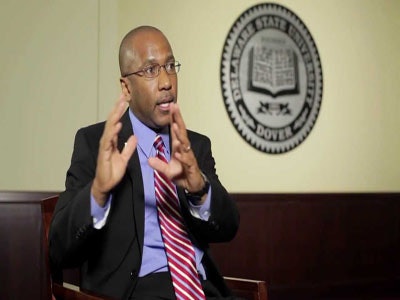When President Trump issued his budget plan for the government’s next fiscal year, his proposed cuts in education programs hit close to home for thousands of people across the nation who count federal assistance as key to their ability to go to and complete college.
 Delaware State University President Harry L. Williams has experienced the benefits of TRIO programs.
Delaware State University President Harry L. Williams has experienced the benefits of TRIO programs.The budget plan, which ignited protests from the higher education community, is set for close and intense Congressional attention in the coming weeks, now that discussion and debate over repeal of the national health care law has been set aside for the moment by Trump and other national leaders.
Trump’s plan would reduce funding for the widely respected TRIO program, an umbrella for grant programs including Upward Bound and Student Support Services that specifically support early intervention and support for poor and first generation students. The proposed cut is seen by TRIO advocates as a mean-spirited blow against what they say is a proven lifeline to opportunity from poverty.
TRIO is among federal assistance programs they feel could greatly help Trump fulfill his promise to help uplift the poorest and least off of Americans.
“There’s a lot to be said about the power of this program,” says Dr. Harry L. Williams, president of Delaware State University (DSU). It plays a “key role” in helping first generation financially poor students succeed despite being initially viewed as high risks for college success.
Williams, president of DSU for the past seven years, knows firsthand of what he speaks. He is an alumnus of the TRIO program which, since its inception in 1965 as one of the late President Lyndon Johnson’s “Great Society” initiatives, has helped thousands of students pursue and complete college.
Today, federal tax dollars allow the U.S. Department of Education help fund some 2,800 college programs across the country that are under the TRIO umbrella — such as the Upward Bound, Student Support Services and the Ronald McNair Post Baccalaureate Achievement Program — that serve some 790,000 students, according to Council for Opportunity in Education.
Fresh out of high school at age 18, Williams entered Appalachian State College (now university) as the first member of his low-income, single-parent family to attend college. With financial aid and work study assistance to help pay for college, focused counseling and mentoring that kept him an track with studies the ‘right’ curriculum, Williams graduated in four years and was set to play a positive role in society.
“I was somewhat shocked,” Williams says of news that President Trump is proposing cutting TRIO funding as part of his overhaul of federal spending next year. Williams, 52, says he would tell Trump directly why cutting TRIO funds would hurt higher education efforts from coast to coast.
Dr. Cindy Wallace, Appalachian State’s student advisor to Williams when he enrolled in 1982 and still mentor and colleague despite her retirement last year as vice chancellor after 32 years in student services, is even more direct in her response.
She echoes TRIO colleagues across the country, asserting cutting TRIO programs is akin to cutting programs that already costs little, “pennies on the dollar,” she says.
Wallace says attacking TRIO programs “goes to the heart of our opportunity to bring a part of our entire population who has not had access to higher education.
These programs have always helped those on the margins,” said Wallace who counseled thousands of students as Appalachian State during more than two decade of working in student services.
“If we did not have TRIO programs, our capacity to outreach to first generation, low -income students would be greatly diminished,” says Carolina Cardenas, director of outreach & early assessment, student academic services, for the massive California State University System.
“TRiO and GEAR UP programs are our most effective outreach programs,” says Cardenas. “Keeping these programs intact provides us the much needed resources that the state does not provide in giving students the opportunity not only to think about attending a two- or four-year (institution), but to attend one. Eliminating these programs will completely demolish our ability to do this.”
In attesting to the value of the TRIO program at his school, Williams says it made the difference for him personal and professional goals in life or resorting to a less desirable path of life. Wallace, in her separate interview, voiced similar comments:
“There are a million Harry’s out there if they don’t get help in those early years,” she says.


















